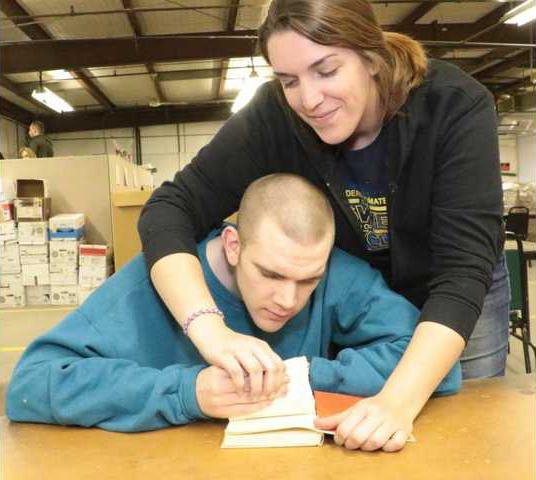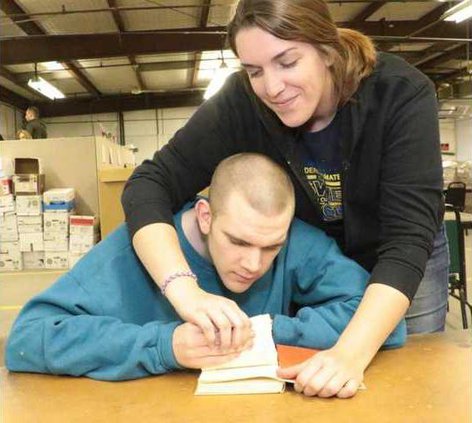Even though Mason Thornton has a job in the recycling operation at Sunflower Diversified Services, he wanted to take on more tasks in the non-profit agency’s lunchroom.
Thornton has autism and Sunflower staff wanted to share his story in observance of National Autism Awareness Month in April.
“Mason really likes to work in the lunchroom, as well as the recycling center,” said Ladeska “Decky” Makings, Sunflower’s interim executive director. “He prepares and wipes tables, and makes coffee. The great thing is, he asks to do these things.”
Thornton’s jobs involve hands-on training by Sunflower staff members “who are amazing,” Makings said. “They have taken the opportunity to get to know Mason and can read his cues about what he wants to accomplish. Then they help him reach his goals.”
Thornton also is making strides at home, leading to more independence. He lives alone and has residential support at all times.
“Mason participates in household upkeep and personal hygiene,” Makings commented. “He knows he is in charge of his life and has a strong voice in making his own decisions.
“All of us enjoy his great sense of humor and unique way of expressing himself,” she added. “We are gratified that we can offer job opportunities, community options and residential supports. All these factors combine to lead Mason on the path to more independence.”
Those who have been diagnosed as having Autism Spectrum Disorder (ASD) display a variety of symptoms and no two people are the same, Makings emphasized.
“If you meet one individual with autism, that is exactly what you have done – met one individual with autism. Each person is different and we must stay away from generalizing about this developmental disorder. It invites stereotyping,” she explained.
Autism is characterized by difficulty in communicating and interacting with people. It can now be diagnosed in the first three years of life; it is a lifelong developmental disability with no clearly identified cause.
Some common characteristics are noticeable, Makings said. One relates to social skills. Mild symptoms may be demonstrated through clumsy social behavior and inappropriate comments. At the other end of the spectrum, the person may show no interest in others.
In addition, many people with autism find it difficult to empathize. However, they can be taught to acknowledge the feelings of other people.
Other symptoms include: being uncomfortable with physical contact; difficulty adapting to changes in the environment; and repeating words and phrases.
“The most important thing about autism today is better diagnostic methods,” Makings commented. “Some people’s symptoms are barely noticeable but we are learning ways to identify more cues. As diagnostic tools improve, more people on the spectrum are receiving the assistance they need.”
Since the condition can be diagnosed at a young age now, Sunflower’s Early Education Center has an Autism Team. “It provides testing for autism and we send the results to a developmental pediatrician,” Makings said. “The physician can use our test results to help reach a diagnosis.
“This is important to our families because their children will be diagnosed by the physician much sooner than in the past. We want to do all we can to help children and adults with autism and their families.”
Sunflower’s service area includes Barton, Pawnee, Rice, Rush and Stafford counties. It is in its 51st year.
Thorntons story shared during Autism Awareness Month





